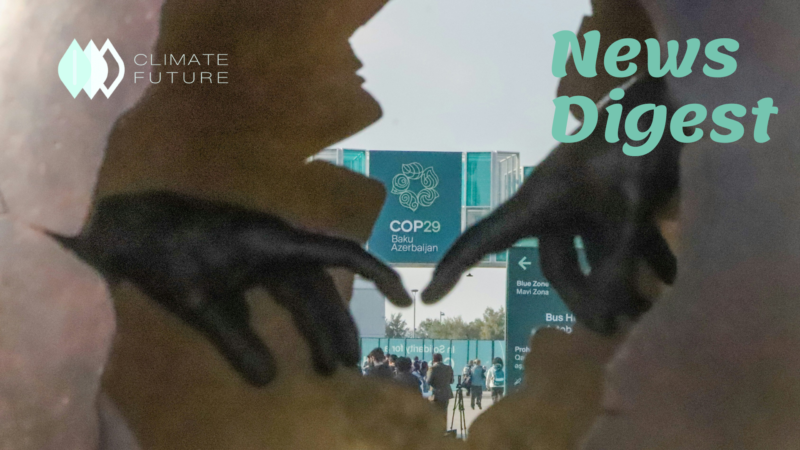Global temperature is likely to exceed 1.5°C above pre-industrial level temporarily in the next 5 years

Pia Harboure/WMO 2024 Calendar Competition
In one of the next five years, there is an 80% chance that global temperatures will push above the 1.5°C threshold relative to pre-industrial times, according to an assessment by the World Meteorological Organisation (WMO). Such developments mean that it is becoming increasingly likely that the goal of the Paris Agreement will be overshot for a while. The IPCC states that we have a 47% chance of seeing the global mean temperature exceed 1.5°C on a 5-year mean basis over the period 2024–2028 and warming would be between 1.1°C to 1.9°C above the 1850–1900 level. At least one year of the period between 2024 and 2028 will exceed 2023 for the temperature as per the estimate. The increasing trend, as highlighted by UN Secretary-General António Guterres, underscores the urgent requirement of aggressive climate action. Urgent emissions reductions, leading to temporary breaches of the 1.5°C threshold, still allow for the long-term goal to be met. Rising sea levels and more frequent severe weather are just two more ways in which the current state of warming affects the environment detrimentally. The monitoring breakthroughs can, however, help to inform mitigation efforts if the goal is to stabilize greenhouse gas concentrations or maybe cool the Earth down again by the end of the century.
The flaws in sustainability reporting

As the Global Reporting Initiative (GRI) has set objective criteria in the standard, Sustainability Reporting Quality (SRQ) is calculated as a combination of the quantitative definition of the report and content-based definition, then it can be measured in the context of the specific company or industry. Similarly, a rating system, often based on a Likert scale, assesses the degree to which the information provided is accurate. For instance, the reporting balance could be scored from 1 (positive events only) to 5 (positive and negative events). The same scale applies to the level of exactness, with 1 indicating mere apparitional data and 5 intricate born-alive, etc. These ratings are useful to researchers in connecting SRQ with other measures (for example, board diversity) to evaluate the ESG performance of firms both within and across industries. However, this approach can also have disadvantages. Since relevant subjects differ depending on the industry and business environment, the quantity of disclosures does not always equate to quality. To guarantee the relevance and coherence of given information, a more thorough examination is required to comprehend how businesses identify material themes. Sustainability reports should also cover actions and pledges for the future rather than just the past. In order to overcome these obstacles, it is necessary to concentrate on the fundamentals of sustainability reporting, stressing the urgency of the climate problem and the seriousness of a company’s commitment and desire to manage consequences.
Green bonds, renewables and transition credits: Climate investing opportunities in Asia

Image: CFA Society Singapore
According to a World Economic Forum report, the biggest disruptions over the upcoming ten years will be related to environmental threats. The urgent problem of climate change calls for trillions of dollars in adaptation and mitigation. A larger role for investors is required in climate finance.
Asia will be the first region to mandate sustainability reporting, which will enhance the transparency and quality of data. Stronger price and policy signals as a result will incentivize businesses to cut emissions.
An excellent investment possibility with strong returns and minimal risk is renewable energy. Transition investment and climate action funds are attracting more and more attention from investors. Raw material traceability disclosure may result in product carbon pricing, which would encourage consumers to select environmentally responsible goods. As we move towards a more sustainable future, businesses should concentrate on lowering their carbon intensity across the board. Accelerating climate action requires collaboration between the financial industry, technology, and other industries. Time is running out to keep global warming to 1.5°C.
Wind industry council to study nature, social impacts of offshore turbines in the Philippines

As the Philippines increases its efforts in clean energy, the Global Wind Energy Council (GWEC) seeks to inform its members about the effects offshore wind turbines have on biodiversity. In collaboration with Ocean Energy Pathway, GWEC is carrying out research to comprehend the impacts on coastal environments, fishing villages, and marine life. As the wind business expands, it is critical that it provide advantages to the economy, society, and environment, according to GWEC’s Mark Hutchinson. The Philippines intends to raise its percentage of wind energy to 12% by 2030. Disruptions to marine activities and possible harm to coral reefs are among the worries. To reduce opposition and delays, GWEC recommends early interaction with stakeholders and steering clear of sensitive locations. Despite these obstacles, the countries of the Asia-Pacific region, including the Philippines, are dedicated to significantly increasing their wind energy output—an estimated 225GW of additional capacity by 2050. On the other hand, supply chain limitations, finance obstacles, and geopolitical issues provide difficulties. For example, sharing of wind turbine components is restricted in nations like South Korea and Japan due to local content laws. Additional obstacles to progress include high installation costs and a shortage of installation vessels. To encourage the expansion of wind energy in the area, GWEC is still working to create a market for clean electricity and competitive procurement procedures.
References
https://www.eco-business.com/opinion/the-flaws-in-sustainability-reporting



